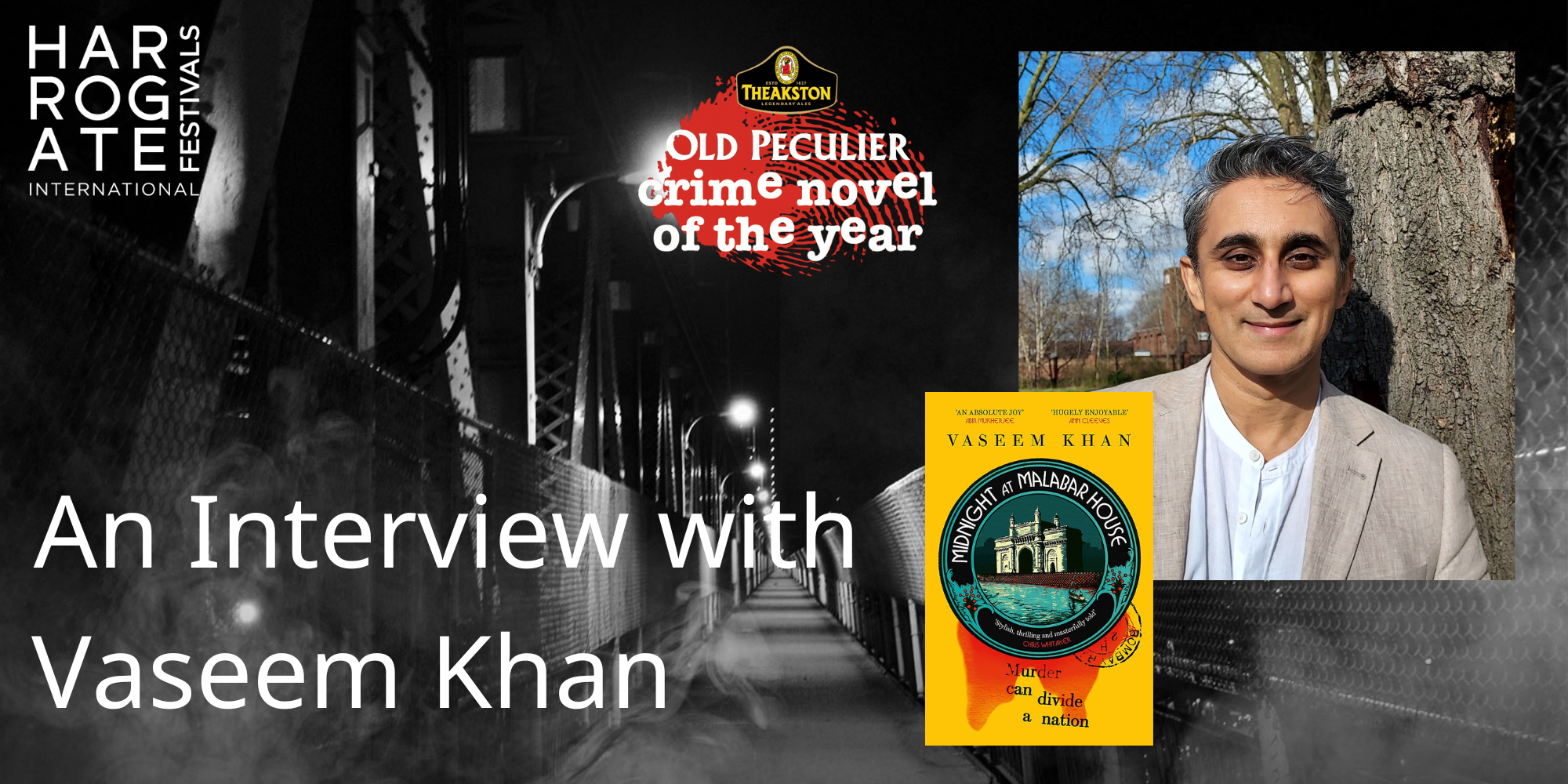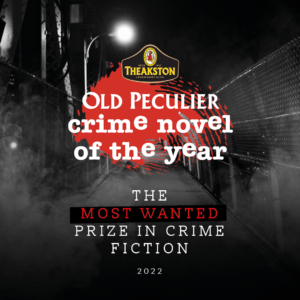
An Interview with Vaseem Khan
We were thrilled to have the opportunity to ask Theakston Old Peculier Crime Novel of the Year Shortlistee Vaseem Khan all of our burning questions.
Read on to find out Vaseem’s writing quirks and what he’s most looking forward to at the Theakston Old Peculier Crime Writing Festival this year.
And don’t forget to cast your vote to decide who will take home the UK and Ireland’s most coveted crime fiction writing award.
We like to start our interviews by asking our authors to introduce themselves. Can you tell our readers a little about yourself?
I’m a mass murderer. Sort of… I’m the author of two award-winning crime series set in India, the Baby Ganesh Agency series set in modern Mumbai, and the Malabar House historical crime novels set in 1950s Bombay. My debut, The Unexpected Inheritance of Inspector Chopra, was a bestseller, and a Sunday Times 40 best crime novels published 2015-2020 pick. In 2021, Midnight at Malabar House, the first in the Malabar House novels set in 1950s Bombay, won the Crime Writers Association Historical Dagger, the world’s most prestigious prize for historical crime fiction.
Though I was born and grew up in London, I lived in India for a decade in my twenties – the most incredible experience of my life! Between my two series I explore the turbulent environment that is modern India and the beginnings of this current version of what is an ancient land – established to a great extent during the period just after India became independent.
Midnight at Malabar House introduced India’s first female police Inspector – Persis Wadia. She’s posted to Bombay’s smallest police station – Malabar House – where all the rejects and undesirables are sent. And then a sensational murder – of an English diplomat – falls into her lap. Persis is working with Archie Blackfinch, an English forensic scientist based in Bombay. They get off to a rocky start, but we immediately know this is going to be one of those will-they-wont-they situations!
1950 is just three years after Indian independence, the assassination of Gandhi, and the horrors of Partition when colonial India was split along religious lines into Pakistan, India, and East Pakistan (Bangladesh). Writing about this period allows me to examine colonialism in India – the era known as the Raj – and how Independent India subsequently adjusted to becoming the world’s largest democracy.
When did you start writing fiction? What made you want to start the long, often arduous, process of writing a book?
I wrote my first novel aged 17 – a Terry Pratchett-esque comic fantasy. Why? Because I loved the notion of being a tweedy writer, a man of letters, admired, envied, a doyen of the literary establishment… and also I thought it would be a good way to avoid having to go to university and get a real job. There was one small problem with my cunning plan… that first book was rubbish! I wrote 6 more novels across 23 years and various genres before finally being published at age 40 with The Unexpected Inheritance of Inspector Chopra, a crime novel about a Mumbai policeman who is forced into early retirement and, while solving a murder, also has to deal with the unusual predicament of inheriting a one-year-old elephant. The book was a bestseller and gave me my start.
What’s the most difficult part of writing a crime book?
You mean there’s an easy bit? Continually coming up with new ideas is like trying to pull the teeth from a crocodile while you’ve got your head in its mouth. And then the long months of constipation over the plot, the hours of research (most of which you never use!), the days when the muse deserts you and you’d rather saw off your own arm than open up your laptop, the social media procrastination… and the endless literary soirees in the company of sweaty, semi-sozzled fellow writers… Oh, wait. That’s the easy bit.
One thing we always love to know, what does your typical writing day look like?
Told in the style of a thriller. “He awakes in a tangle of sweaty sheets, knowing that, once again, a deadline is looming. His heart hammers as he imagines another passive-aggressive email from his editor… The house whispers darkly as he slips into the creaky seat in front of his aging laptop. Sweat shimmers on his brow. He has one shot to get this right. One mistake and everything he has ever loved will be lost. He sweats some more as he wrestles with the Impossible Problem… How does one come up with yet another TWIST THAT NO ONE CAN SEE COMING…?”
I’m a plotter. I use a spreadsheet to plan out every ‘scene’ in the book, complete with a sensational murder (or two), clues, red herrings, and alternate suspects. I then layer in background detail, and an overall theme I want to explore. So in Midnight at Malabar House, for instance, I wanted to showcase how Partition created communal tension in post-Independence India. Once I begin writing, I rattle along at about 1000 words a day – early in the morning when my brain still works!
We’ve heard of some unusual writing habits over the years, what would you say is your most interesting writing quirk?
I like to hire a private mariachi band to play outside my window to remind me a deadline is coming up…. OK. So I made that up… I suppose my only quirk is that I sometimes write on a cricket pitch. This is because when I play I normally get out very quickly and then I have nothing to do but sit on the sidelines swearing at my teammates… or writing.
Which writers have influenced your own writing the most?
Dostoevsky’s Crime and Punishment is a literary crime novel that struck me as dryly amusing when I first read it. That dry wit is something I use. Other writers I admire: Salman Rushdie (Midnight’s Children is still the best book about India I’ve ever read), and Michael Connelly, author of the Harry Bosch crime novels set in L.A. I’ve got every single one and watched all the TV series too. Plus Connelly and I shared a UK publicist for a while and I got to meet him. It’s amazing when your heroes turn out to be genuinely nice people!
What’s the best book you’ve read recently?
I rather enjoyed Miss Aldridge Regrets by Louise Hare. Hare’s protagonist is a mixed-race woman who finds herself aboard the Queen Mary in 1936, travelling to a bright new future in America, only to become ensnared in the web of a fiendish murderer. Tackling issues of race and class, the novel delivers as both a Golden Age mystery and an examination of the social mores of the age.
What would winning the Theakston Old Peculier Crime Writing Novel of the Year Award mean to you?
For a start it would be a vindication that I hadn’t wasted the 23 years it took me to get published! Finding myself in bed with previous winners and nominees is both humbling and exhilarating and a whole bunch of other adjectives ending in -ing. The award has established itself as one of the most coveted in the world of crime fiction, a mark of quality. I feel an immense sense of pride to be associated with it. Of course, winning it would also mean I would finally be above the law (I think)!
Which event at the Theakston Old Peculier Crime Writing Festival are you most looking forward to?
That’s not fair! It’s like asking me which of my friends I’d gladly sacrifice in a hostage situation… OK. Fine. I’m looking forward to the historical crime fiction panel I’m speaking on myself – Moments in Crime – on the Sunday. Also the Creative Writing sessions I’m running on the Thursday, about writing characters outside of your own culture… Oh, you want something that’s NOT all about me?… I’m looking forward to seeing Tess Gerritsen speak, to the session ‘It’s a Long Hop, not a Short Sprint’ – about crime writers who’ve built up to success over a period of time – and, of course, the incomparable Michael Connelly on stage with Mark Billingham.

About the book:
Bombay, New Year’s Eve, 1949. As India celebrates the arrival of a momentous new decade, Inspector Persis Wadia stands vigil in the basement of Malabar House, home to the city’s most unwanted unit of police officers. Six months after joining the force she remains India’s first female police detective, mistrusted, sidelined and now consigned to the midnight shift. And so, when the phone rings to report the murder of prominent English diplomat Sir James Herriot, the country’s most sensational case falls into her lap. As 1950 dawns and India prepares to become the world’s largest republic, Persis, accompanied by Scotland Yard criminalist Archie Blackfinch, finds herself investigating a case that is becoming more political by the second. Navigating a country and society in turmoil, Persis, smart, stubborn and untested in the crucible of male hostility that surrounds her, must find a way to solve the murder – whatever the cost.
About the author:
Vaseem Khan is the author of two crime series set in India: the Baby Ganesh Agency series, and the Malabar House historical crime novels. His first book, The Unexpected Inheritance of Inspector Chopra, was a Times bestseller and has been translated into 15 languages. In 2018, he was awarded the Eastern Eye Arts, Culture and Theatre Award for Literature. Vaseem was born in Newham, but spent a decade working in India as a management consultant.


About the award:
The most prestigious award in crime fiction, the Theakston Old Peculier Crime Novel of The Year marks it’s eighteenth year in 2022.
The award celebrates excellence, originality, and the very best in crime fiction from UK and Irish authors. A highlight in the literary calendar, past winners include Denise Mina, Steve Cavanagh, Val McDermid and Chris Brookmyre. Awarded annually as part of Harrogate International Festivals’ Theakston Old Peculier Crime Writing Festival, the winner of the most wanted accolade in crime fiction receives a cheque for £3000, and an engraved oak beer cask, hand-carved by one of Britain’s last coopers from Theakstons Brewery.
The winner will be announced at the Theakston Old Peculier Crime Awards and Party on Thursday 21st July 2022.
Book your tickets to the Theakston Old Peculier Crime Novel of the Year Award Show here!

